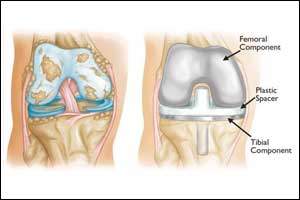- Home
- Editorial
- News
- Practice Guidelines
- Anesthesiology Guidelines
- Cancer Guidelines
- Cardiac Sciences Guidelines
- Critical Care Guidelines
- Dentistry Guidelines
- Dermatology Guidelines
- Diabetes and Endo Guidelines
- Diagnostics Guidelines
- ENT Guidelines
- Featured Practice Guidelines
- Gastroenterology Guidelines
- Geriatrics Guidelines
- Medicine Guidelines
- Nephrology Guidelines
- Neurosciences Guidelines
- Obs and Gynae Guidelines
- Ophthalmology Guidelines
- Orthopaedics Guidelines
- Paediatrics Guidelines
- Psychiatry Guidelines
- Pulmonology Guidelines
- Radiology Guidelines
- Surgery Guidelines
- Urology Guidelines
Injections of anaesthetic agents recommended during knee replacement for Post Operative pain relief

A new study led by researchers at University Hospitals Coventry and Warwickshire (UHCW) NHS Trust and the University of Warwick has recommended an alternative method of pain relief for patients undergoing knee replacement surgery.
Over 250 patients having knee replacements at UHCW took part in the study, reported this month in The Bone and Joint Journal, a highly-regarded specialist international publication for Orthopaedic surgeons.
The study was funded by the National Institute for Health Research (NIHR) Research for Patient Benefit (RfPB) Programme.
A traditional option for pain relief during knee replacement surgery is a 'femoral nerve block'; a single dose of local anaesthetic injected around the femoral nerve in the groin, which is typically administered by an anaesthetist. However, a newer alternative approach uses an injection of anaesthetic agents around the knee joint and is administered by the surgeon without the need for specialist equipment.
The study found that patients who had the knee injections required lower doses of powerful painkillers such as morphine after surgery. Morphine can cause serious and troublesome side effects in postoperative patients and is best avoided if possible. Also, unlike a femoral nerve block, there is no need for specialist equipment like ultrasound. This is therefore likely to save surgeons and anaesthetists valuable time and resources and improve patient care.
A tribute was published in the article to Mr Andrew Sprowson, a Consultant Orthopaedic Surgeon at UHCW, and Associate Professor at the University of Warwick, who had been Chief Investigator in the study until his untimely death in March 2015.
Mr Peter Wall, Clinical Lecturer at UHCW NHS Trust and University of Warwick, and lead author of the report, said:
"Our study has demonstrated the advantages of injections of anaesthetic agents around the knee during knee replacement surgery over other methods. These injections are now shown to be safe and effective. They also involve fewer resources and reduce the need for powerful painkillers such as morphine.
"This is to be welcomed as the potential risks of morphine-type pain relief are well known and should be avoided where possible. We hope that these study findings, if put into practice, will benefit patients around the world.
"I want to emphasise the debt we owe to our late colleague Andrew Sprowson. Without his initiative and enthusiasm, this research study would not have taken place."
For more details click on the link : http://www2.warwick.ac.uk/newsandevents/pressreleases/new_study_recommends/

Disclaimer: This site is primarily intended for healthcare professionals. Any content/information on this website does not replace the advice of medical and/or health professionals and should not be construed as medical/diagnostic advice/endorsement or prescription. Use of this site is subject to our terms of use, privacy policy, advertisement policy. © 2020 Minerva Medical Treatment Pvt Ltd